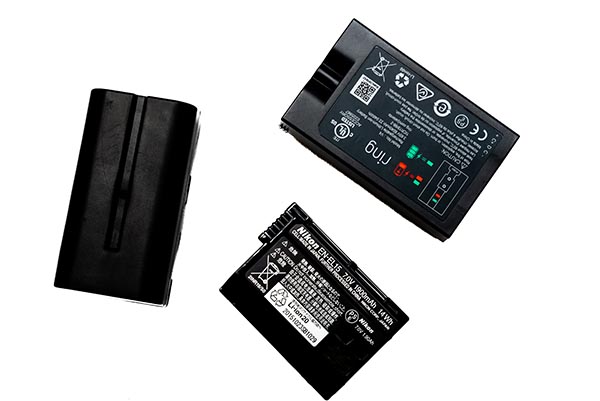lithium-ion batteries are a type of rechargeable batteries commonly used in portable electronics such as digital cameras, mobile phones, tablets, and laptop computers. They are so popular these days due to their high energy storage capacity, lightweight, and longer life.

Lithium-ion batteries hold their charge for a longer period than other types of rechargeable batteries. They can handle hundreds of charge/discharge cycles and has no memory effect.
Your batteries will perform well and last longer if you properly maintain them. I will give you some tips to take care of your lithium-ion batteries.
1. Always use a charger that is specifically designed for your battery.
Lithium-ion batteries come in deferent shapes, sizes, and capacities. They may have different voltage ratings. For example, my Nikon DSLR camera battery is 7.0V, 1900mAh, my Ledgo LED light panel battery is 7.4V, 2000mAh, and my Ring security camera battery is 3.65V, 6040mAh.
They all need different voltage and current ratings for charging. If you use a higher voltage charger, your battery will overheat or explode. If you use a lower voltage, your battery won’t get a full charge.
So, using a proper charger is extremely important when charging your lithium-ion batteries.
2. Slow charging is better than quick charging.
Charging your battery with a slow charger is always recommended. Your Samsung mobile phone may come with a standard charger and a quick charger. You may be tempted to use the quick charger every time. That will charge your phone in 30 minutes. However, your phone’s battery will get damaged in a few months.
Your battery will hold more charge and last longer if you charge it in a standard charger.
3. Do not overcharge your batteries.
Charging your battery to 100% and leave it in the charger for a long time can reduce battery life. Some chargers automatically adjust the charging current when the battery reaches 100%. However, if you charge your battery to 80-90% charge, they will last longer.
4. Don’t drop your battery.
Don’t drop your lithium-ion battery on a hard surface such as concrete. Your battery may suffer damage from a fall or vibration. Damaged batteries won’t hold their charge properly and there is a chance of leaking or fire hazard.
5. Charge your batteries to about 50% before long term storage.
If you are not going to use your battery for a few months, charge it to about 50% of the capacity before storing it in a secure place. You should remove the battery from the device if possible and use the terminal cap to protect the terminals from getting dust.
Check your stored battery every 3 months. Your battery may lose some charge at that time, so charged it again to its 50% capacity.
It is not recommended to store the battery fully charged or completely flat.
6. Keep the terminals clean.
The battery terminals can get dirty over time. Dust can accumulate on them. When you are not using the batteries, keep the plastic terminal cover on. That will keep the terminals clean.
7. Never short circuit the terminals.
Short-circuiting means touching both terminals at the same time with an electrical conductor such as metal. It will cause tremendous electrical current passing through the battery. The battery will overheat, get damaged or even explode.
The battery terminals may be located very close to each other. So, take care when using tools like a screwdriver when handling lithium-Ion batteries.
Never store the batteries in contact with metal objects.
8. Store your batteries in a cool, dry place.
Storing lithium-ion batteries at a constant high temperature can significantly reduce their lifespan, run time and charge capacity. It can also permanently damage the batteries.
Don’t store them near a heater, oven, or near a window with direct sunlight. Store them in a place with a cooler temperature.
Moisture or too much humidity can damage the batteries, so keep them dry. You can use silica crystal moisture absorbing sachets to keep the batteries dry.
9. Flying with Lithium-Ion batteries.
Spare lithium-ion batteries must be carried in carry-on baggage only. The battery terminals must be protected from short circuit. You can leave the batteries in their retail packaging, cover the battery terminals with tape, or use a battery case. You can also put them in battery sleeves in a camera bag, or in a plastic bag or protective pouch.
Devices with installed batteries such as mobile phones, iPad, and cameras can be carried in checked baggage. However, it is not recommended to carry any expensive equipment in a checked bag.
Lithium batteries recalled by the manufacturer or vendor should not be carried on an aircraft.

About the author: Victor is a freelance photographer, technophile, and founder of vxanswers.com.
